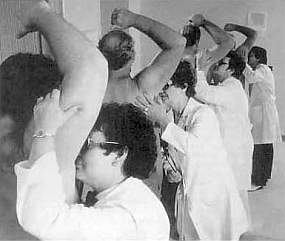The last few days, I’ve been unable to shake this thought: In what ways do American Christians appear different from their non-Christian neighbors?
I’m sure each of us knows of people who volunteer their time to help the less fortunate, take opportunities to seek out deeper meaning in life, are kind and considerate, who engage in common rituals, pay their taxes, love their kids, help their neighbors, work hard to better their community, shun the obvious sins, and are generally nice, fine people.Yet those same folks make no pretenses of being born-again believers in Jesus.
For some reason, though, we apply those same traits and qualities to Christians and ascribe them a passing grade for being a good follower of Christ.
The Bible says:
But thanks be to God, who in Christ always leads us in triumphal procession, and through us spreads the fragrance of the knowledge of him everywhere. For we are the aroma of Christ to God among those who are being saved and among those who are perishing, to one a fragrance from death to death, to the other a fragrance from life to life. Who is sufficient for these things? For we are not, like so many, peddlers of God’s word, but as men of sincerity, as commissioned by God, in the sight of God we speak in Christ.
—2 Corinthians 2:14-17
Any guy who has wondered about the suitability of a garment worn once knows about the sniff test. Stick a nose in that shirt and inhale. If it doesn’t smell like Satan’s backside, it’s still wearable.
Christians have their own sniff test to pass, though the aroma is far more pleasing than a simple lack of BO. At least it should be.  What really bugged me as I thought about this passage is that I’m no longer certain if the Church in America today smells any different than the world.
What really bugged me as I thought about this passage is that I’m no longer certain if the Church in America today smells any different than the world.
In a lot of ways, too many Christians in America ARE little more than peddlers of God’s word. In fact, we’ve somehow made being a peddler of God’s word a good thing, as if it shows commitment to a spiritual life! Even worse, too many of us aren’t even devoted enough to be a peddler of God’s word. We just kind of exist. Just like that nice, fine non-Christian who pays his taxes and volunteers to read to elderly people a few times a week.
Seriously, I think that too many of us have substituted rituals for genuine knowledge of Christ. And for those who claim genuine knowledge of Christ, what of their lives makes them smell different from the rest of humanity? What does genuine Christianity look like in America 2010?
I like Keith Green. His music has meant a lot to me. In one of his live recordings, he says that the defining quality of a true Christian is being bananas for Jesus. Again, I like Keith, but the tepid applause on that recording to his definition underlines his swing and miss. Being bananas for Jesus simply isn’t enough.
What I cannot escape is this passage:
For all who are led by the Spirit of God are sons of God.
—Romans 8:14
Ask any Christian about being led by the Spirit of God, and you’ll get a million different replies as to what that means. Most of those answers, sadly, will fall into a category of vague impressions about decision-making or about being nice to people—again, the kinds of motivations that stir non-Christians. That’s not good enough to pass the sniff test.
Consider this:
Now there was a disciple at Damascus named Ananias. The Lord said to him in a vision, “Ananias.” And he said, “Here I am, Lord.” And the Lord said to him, “Rise and go to the street called Straight, and at the house of Judas look for a man of Tarsus named Saul, for behold, he is praying, and he has seen in a vision a man named Ananias come in and lay his hands on him so that he might regain his sight.” But Ananias answered, “Lord, I have heard from many about this man, how much evil he has done to your saints at Jerusalem. And here he has authority from the chief priests to bind all who call on your name.” But the Lord said to him, “Go, for he is a chosen instrument of mine to carry my name before the Gentiles and kings and the children of Israel. For I will show him how much he must suffer for the sake of my name.” So Ananias departed and entered the house. And laying his hands on him he said, “Brother Saul, the Lord Jesus who appeared to you on the road by which you came has sent me so that you may regain your sight and be filled with the Holy Spirit.” And immediately something like scales fell from his eyes, and he regained his sight. Then he rose and was baptized; and taking food, he was strengthened. For some days he was with the disciples at Damascus.
—Acts 9:10-19
Isn’t that the “led by the Spirit of God” that Paul is talking about in Romans 8:14? How ironic that it serves as part of his own conversion story.
Now we can talk all we want about visions and miracles and so on, but part of us doesn’t believe they’re real. We’re hardcore rationalists in America, and if someone came up to us and shared the story that God said to go down to such and such a place to pray over a blind enemy so that enemy would receive his sight again, our deflector shields would be cranked up to 11. The first thought we’d have is that this is a dangerously unstable individual. A religious nutjob.
And that’s why we no longer pass the sniff test.
If we’re to be the aroma of Christ, then we have to smell—and act—in ways that look nothing like the world. I’m not talking about being an anti-culture warrior, either, but living supernaturally.
Too many of us have lost that aroma because we have no place in our lives for being led by the Spirit. The only thing that separates the person with Christian sympathies from the genuine believer is the presence of the Holy Spirit indwelling the believer. No religion on this planet makes the contention that Christianity does about the indwelling of the Holy Spirit. That IS the mark of the Church.
Yet the average “born-again Christian” in America exhibits no signs of being indwelt by God Himself. There may be plenty of signs of being a “peddler of God’s word,” but next to nothing that shows evidence of the genuinely supernatural. And if that’s the case, that person won’t pass the sniff test.
The only hope for the American Church is that we get serious about rectifying the lack of presence of the Holy Spirit in our lives. Christians are not of this world. Our Kingdom flows from the supernatural and penetrates the natural. If that’s not how we think, work, and live, then it’s no wonder that we smell like this decaying world.

 Today’s post is a tough word that may anger a few people. Asking people to give is always a tricky proposition. In the Church, it’s an even more sensitive issue because we have tied giving with our spirituality. Plenty of churches still exist where one’s piety is measured by how readily one ponies up the moolah.
Today’s post is a tough word that may anger a few people. Asking people to give is always a tricky proposition. In the Church, it’s an even more sensitive issue because we have tied giving with our spirituality. Plenty of churches still exist where one’s piety is measured by how readily one ponies up the moolah. He’s perfect. Unlike one craptacular, modern, “How to Do Church” book after the other, the Holy Spirit guides into all truth. Not some truth, but all truth. He’s the ultimate source for making the Church all She can be.
He’s perfect. Unlike one craptacular, modern, “How to Do Church” book after the other, the Holy Spirit guides into all truth. Not some truth, but all truth. He’s the ultimate source for making the Church all She can be.